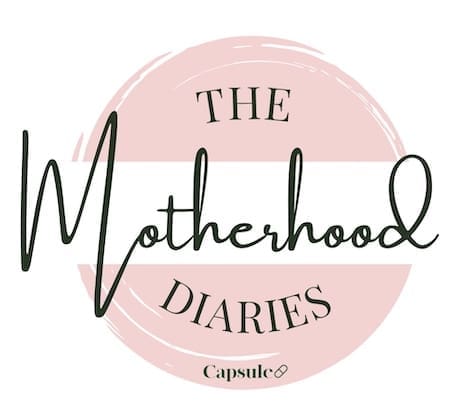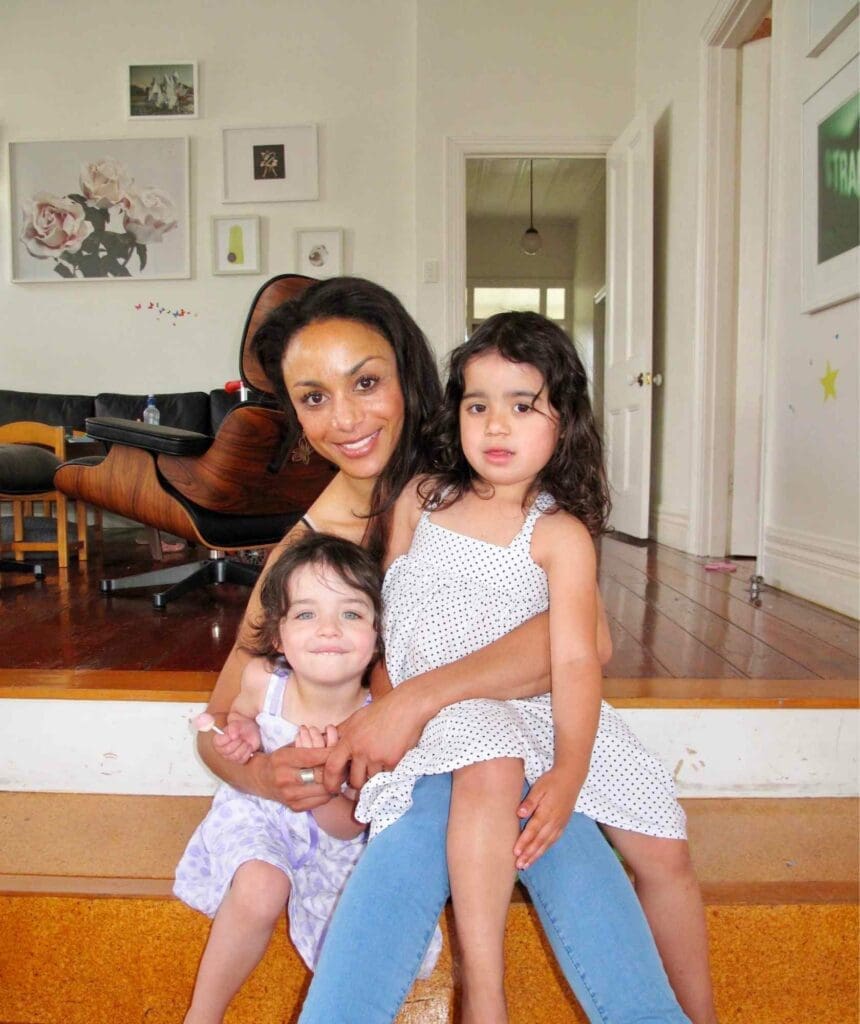
Welcome to our series, The Motherhood Diaries – a safe space for you to share your experiences, advice, hopes and heartbreaks. We’ll be hearing from industry experts giving practical advice alongside Capsule readers (You!) sharing your firsthand experiences. We’re looking at everything from fertility, trying to conceive, pregnancy, the fourth trimester, newborns, toddlers, children’s mental health and teenagers, fertility issues and everything in between! Today, we talk to Sonia Gray about parenting a neurodivergent child – and her own ADHD diagnosis.
“I always thought motherhood was ‘you just have to love them and everything will work out, and that’s being a good parent,’” says TVNZ presenter Sonia Gray, mother of 13-year-old twin girls Thandie and Inez. “I did all the things – I read all the books, I did all the parenting courses and I couldn’t get my daughter to stop crying, as a baby, and then I could not get her to do the other things that kids did. It didn’t matter how much love I gave her, or how much I Googled my way through it. And it’s been a process to both relinquish that control, and also the guilt.”
‘I wanted to know how to help my kid live in this world.’
Sonia and her husband Simon knew that their daughter Inez was experiencing different difficulties to her sister and peers as she grew older and started experiencing violent outbursts and running away from school. The process to get a diagnosis was hard in itself – Inez was initially diagnosed as Autistic, but then also diagnosed with other conditions, including ADHD, OCD and ODD (oppositional defiant disorder) later on. But the process to find support and advice was another battle altogether. It’s the main reason that Sonia signed on to be the executive producer and presenter of TVNZ+ documentary Kids Wired Differently (premieres tonight on TVNZ1 at 8.40pm).
“The initial diagnosis was done very quickly, and I didn’t think it was the full picture, but I appreciated that I had something concrete that I could take to her school and say, ‘This is what we’re dealing with,’ and then we would get support.”


Sonia says she assumed there would be “some sort of roadmap” about parenting a neurodivergent child following the diagnosis. “If you get a diagnosis for cancer, someone lays out all your options. It’s so thorough, which is amazing,” she says. “But there was really nothing [for us]. We got a little bit of money, but that wasn’t what I wanted – I wanted to know how to help my kid live in this world.”
“You have to become the squeaky wheel – at school, at everything. Everything is a fight. You have to advocate for your kid and keep getting up, all the while you are dealing with that kid at home, you are dealing with the grief that your kid is going to struggle throughout their life, and then you have to do all the work. Even just the acronyms! You’re dropped into a world that you know nothing about.”
She estimates that 90% of the support she and Simon got was from other parents who had gone down the same path with their own children, but that not everyone has that kind of community. “When your kid has violent meltdowns, which is their response to stress, you get really scrutinised as a parent. So a lot of parents shut down and hide away, because they’re scared.”
One of Sonia’s good friends, who also appears in the documentary, is Rachel King, whose son was having behavioural difficulties similar to Inez’s. “We met because I was crying outside of the school gates after another terrible morning and one of the mums said, ‘I know this seems bad, but I’ve got a friend who thinks her son is going to go to jail.’ And I said, ‘I need to meet her.’”
‘The self-confidence of these kids is knocked at a really young age and that’s really hard to get back.’
“It was so good to have someone who understood, and was struggling in the same way, because by that stage, I was starting to think it must be me. ‘Maybe I’m just a really shit parent who has done everything wrong.’ But once I started to become more public about what we were going through, people just started coming out of the woodwork. And it made me think, ‘what are we doing wrong as a society?’”
“Because these kids are beautiful, bright lights that are trying really hard to fit into a world; they know that they’re different from really early on and believe that there’s something wrong with them. The lack of self-worth is what worries me the most, because the self-confidence of these kids is knocked at a really young age and that’s really hard to get back.”
There are two statistics that show how varied the path can be for young people who share a diagnosis like Inez’s. Approximately 25% of kids go onto develop another condition called conduct disorder – and half of those kids end up in jail. Then, on the other side, it’s estimated that half of the world’s entrepreneurs are on the neurodiverse spectrum. This is the reality that those parenting a neurodivergent child have to live with – kids who are wired differently can have incredibly different outcomes, but a lot of that comes down to support and resources – and there is rarely enough of those to go around.
“When those kids have tried and tried and tried and then think, ‘there is no place for me here,’ then that’s really tough. I remember reading about Richard Branson – who is dyslexic – that his teacher at school said to him, ‘You’re either going to end up a billionaire or in prison.’ It’s another reason that parents feel quite desperate, because they can see how talented their kids are but they just need so much more. It’s not their fault that they’ve been dropped into a society that doesn’t work for them.”
After Inez was diagnosed, it was recommended that Sonia and her husband get tested because there tends to be a genetic path to neurodiversity. It was then that Sonia herself was diagnosed with ADHD – a diagnosis, she says, that came as a relief.
‘You have to be organised and 10 steps ahead of your kids. And I’m five steps behind myself.’
“It explained everything – and to my mum, it explained my childhood. I don’t know if ‘validating’ is the right word, but I wasn’t just disorganised and lazy and all over the show, there was a reason for it.”
“There are certain expectations in our society that you are compliant, that you get places on time… and actually, that’s really hard for people who have sensitivity problems,” she says. “And most of them are not like Nezzy, most of them are like me – really good at masking and fitting it, after realising early on ‘Okay, I see how I’m meant to be’. But that is exhausting – and there are a lot of women who are discovering later on in life that they have ADHD, usually because their kids have been diagnosed, and they’ve had a lifetime of having mental health issues or anxiety.”
“And as a parent with ADHD? Oh my god. You have to be organised and 10 steps ahead of your kids. And I’m five steps behind myself,” Sonia laughs.
She says that one of the things that has been most helpful for both herself and the family is changing her expectations of what life should be like. “You reach a point where you make peace with that fact that our life is just different, and we stay at home a lot more, and that’s okay. It’s humbling – and there’s a beauty in that. Because I was really aware that me trying to get Nezzy to do all these things was not helping – you do have to push your child forward a bit, but the stress that ‘we have to do things like other families’ is holy unhelpful.”
“A big thing with kids like this is trust – because their trust has been broken from day dot, because they’re constantly put into situations they’re not comfortable with. So making sure that Inez trusts that I’m by her side all the time.”
For parents who are earlier on in the process of dealing with a neurodiverse diagnosis, Sonia says it’s important to know you’re part of a community. “Everywhere you go, you’ll just see these ‘normal’ families and you will feel like the only person in the world going through this. And it’s not true – there are a lot of us who understand what you’re going through and the fear you have for your child’s future.”
It’s one of the reasons Sonia wanted to make Kids Wired Differently – to let those parenting a neurodivergent child know they are not alone. There’s also a Kids Wired Differently Facebook group for viewers to engage with other families going through the same journey. She also hopes that in the future, a diagnosis comes with less scary statistics and more of a ‘here are some of the amazing skills that you have’ sense of guidance, so that both the kids and their parents feel less scared and alone.
“At the beginning, there’s a feeling of treading water in this big ocean, and there’s no lighthouse that you can see,” Sonia says. “I can’t be the lighthouse for everyone but I want to try and establish that lighthouse, because when you feel alone in this, it’s 10 times worse.”
TVNZ+ documentary Kids Wired Differently premieres tonight on TVNZ1 at 8.40pm and then streams online.

